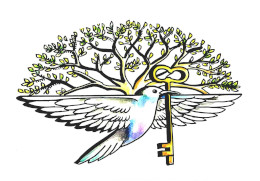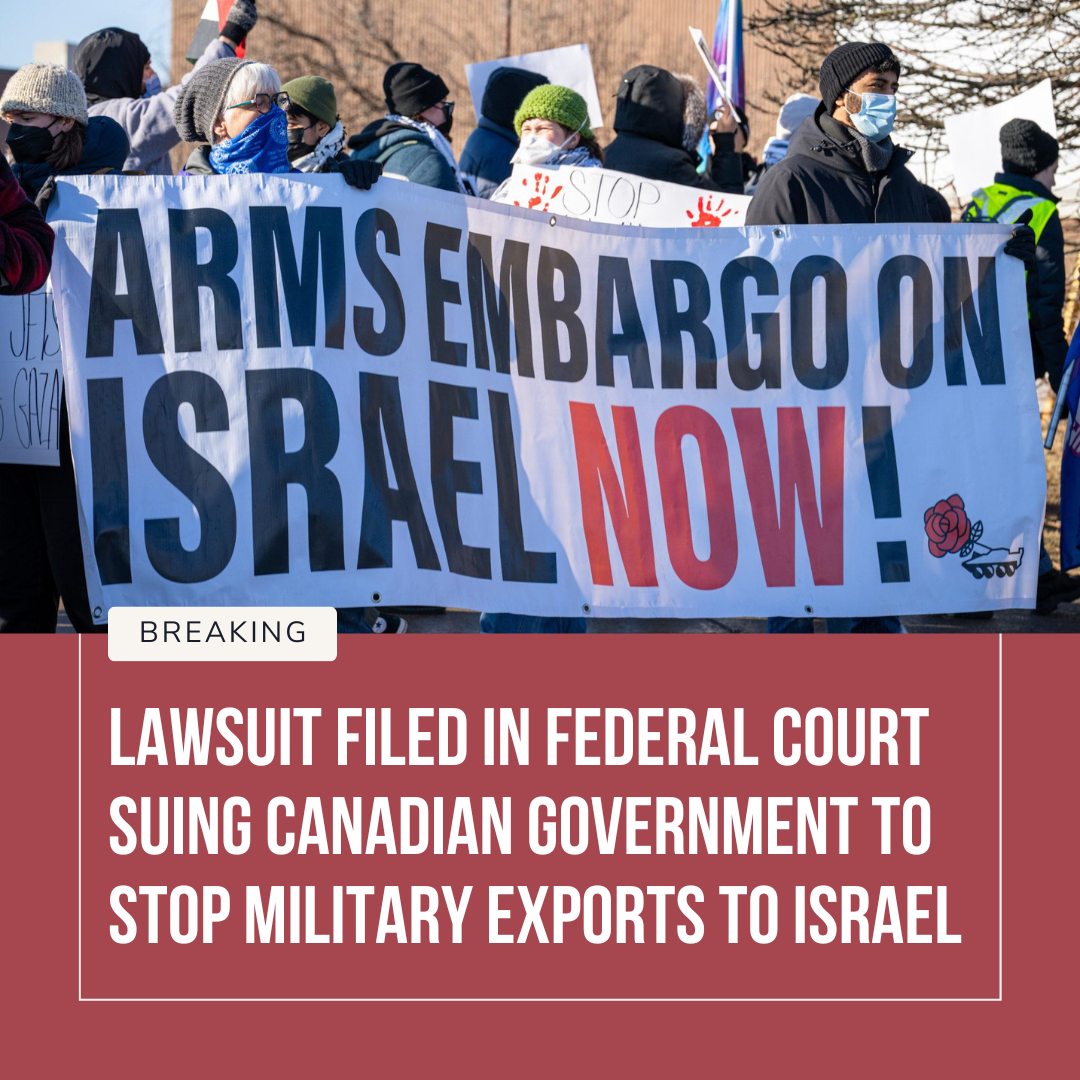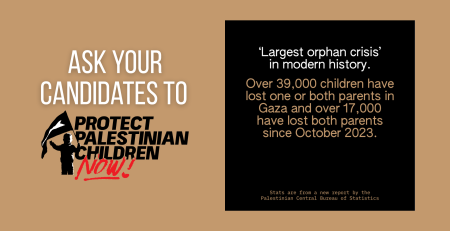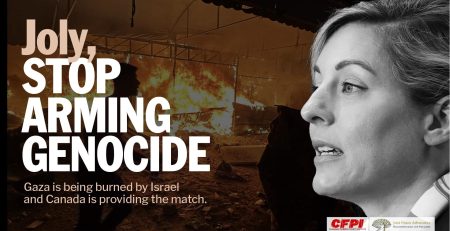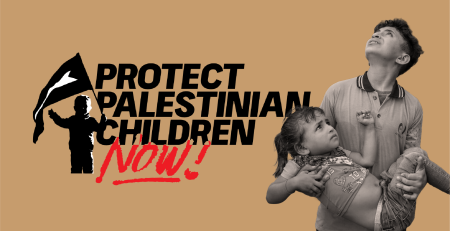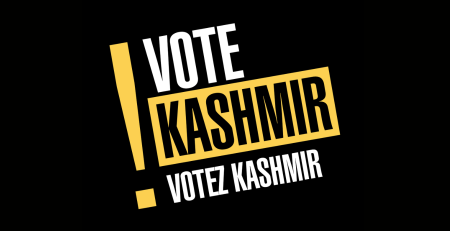FOR IMMEDIATE RELEASE
March 5, 2024
le français suit
LAWSUIT FILED AGAINST CANADIAN GOVERNMENT TO STOP ARMS EXPORTS TO ISRAEL
TORONTO – A group of Canadian and Palestinian applicants have commenced legal proceedings in the Federal Court against the Canadian government to stop arms exports to Israel.
The applicants are seeking a court order that the Government of Canada cease issuing export permits for all military goods and technology destined for Israel, and that the issuing of these permits be declared unlawful under Canadian and international law. “It’s cruel and reprehensible that our government has continued to provide material support to Israel’s atrocities, while at the same time cutting off humanitarian support to the victims of those same atrocities,” said Hammam Farah, one of the applicants.
The lawsuit comes on the heels of the near unanimous January 26, 2024 ruling of the International Court of Justice which found that a “plausible” case for genocide in Gaza was made out and reiterated the obligation of States to prevent genocide. On February 23, 2024, UN experts released a statement warning that “[a]ny transfer of weapons or ammunition to Israel that would be used in Gaza is likely to violate international humanitarian law”, and urged States to immediately halt arms transfers to Israel.
The applicants argue that the Export and Import Permits Act and the Canadian Charter of Rights and Freedoms prevent Canada from allowing Canadian companies to export military goods and technology to Israel due to the substantial risk that these items could be used to commit serious violations of international law and serious acts of violence against women and children.
The application lists Israel’s reported violations of international human rights and humanitarian law, and its serious acts of violence against women and children arising from its military operations in Gaza and the West Bank, including the plausibility that Israel is violating the Convention on the Prevention and Punishment of Genocide.
In the past weeks, Canadians have demonstrated growing concern about the continued flow of arms from Canada to Israel amid credible reports of serious violations of international law by the latter in the course of the conflict in Gaza. According to Rachel Small from World Beyond War, Canada’s arms exports to Israel have actually spiked dramatically during the conflict.
“Despite recent statements by Prime Minister Trudeau and Foreign Affairs Minister Joly denying that Canada was exporting any weaponry to Israel, the Trudeau government had in fact authorized at least 28.5 million dollars worth of new permits for military exports to Israel during the first two months of the state’s bombardment and starvation of Gaza, more than in the entire previous year,” said Small.
As a result, people across Canada are escalating their demands for an arms embargo. Small noted that last week, hundreds of people held blockades at seven weapons facilities and companies that produce military components and weapons systems that are being used by the Israeli military. “In both the courts and the streets it is critical to hold the Canadian government to account until the flow of weapons to Israel ends,” she said.
The lawsuit is part of a growing trend of similar lawsuits filed in countries like the US, the UK, and the Netherlands, where an appeals court found that “it is undeniable that there is a clear risk that the exported F-35 parts are used in serious violations of international humanitarian law”. Other countries like Spain, Italy, and Belgium have also announced that they have suspended arms sales to Israel due to the ongoing atrocities.
The lawsuit follows a letter sent by the applicants in January that notified the government that approving the export of Canadian military goods and technology destined for Israel violates both Canadian and international law. The letter demanded a response from Canada confirming that it had stopped this illegal activity within fourteen days. After receiving no response, the applicants commenced legal proceedings.
“Canada’s contempt for international and Canadian law by approving a dramatic increase in military exports to Israel since the latter commenced its bombardment of Gaza compels us to seek legal action to hold Canada to account,” said Ayman Oweida, another one of the applicants.
The applicants are Hammam Farah, Hiba Farah, Ayman Oweida, and a confidential Palestinian applicant, as well as the Canadian organization Canadian Lawyers for International Human Rights (CLAIHR) and the Palestinian organization Al-Haq – Law in the Service of Man. They are represented by a team of lawyers including Barbara Jackman, C.M., James Yap, and Veromi Arsiradam.
About the Applicants
Canadian Lawyers for International Human Rights (CLAIHR), founded in 1992, is a nongovernmental organization of lawyers, law students, and legal academics working to promote international human rights within and in connection to Canada.
Al-Haq – Law in the Service of Man is an independent Palestinian non-governmental human rights organization established in 1979 in Ramallah, West Bank, to protect and promote human rights and the rule of the law in the Occupied Palestinian Territory (“OPT”).
Hammam Farah is a Canadian citizen of Palestinian origin and a psychotherapist who resides in Ontario. He has many family members and friends who are members of the Holy Family Church, the last remaining Roman Catholic Church in Gaza. Since October 9, 2023, some of his family and friends in the OPT were killed by Israeli military personnel.
Hiba Farah is a retired Canadian citizen of Palestinian origin who resides in Ontario. She has many family members and friends who are members of the Holy Family Church, the last remaining Roman Catholic Church in Gaza. Since October 9, 2023, some of her family and friends in the OPT have been killed by Israeli military personnel. She is the mother of the Applicant Hammam Farah.
Dr. Ayman Oweida is a Canadian citizen of Palestinian origin who resides in Québec. He is Assistant Professor in Radiobiology, Nuclear Medicine, and Immunology at the Université de Sherbrooke. Since October 9, 2023, some of his family members in Gaza were killed by Israeli military personnel.
The confidential applicant is a 26-year old Palestinian woman from Gaza who resides in Ontario. She is currently seeking asylum in Canada. Her immediate family still resides in Gaza.
Key Excerpts – Export and Import Permits Act (R.S.C., 1985, c. E-19), sections 7.3-7.4
Mandatory considerations — export and brokering
7.3 (1) In deciding whether to issue a permit under subsection 7(1) or 7.1(1) in respect of arms, ammunition, implements or munitions of war, the Minister shall take into consideration whether the goods or technology specified in the application for the permit
(a) would contribute to peace and security or undermine it; and
(b) could be used to commit or facilitate
(i) a serious violation of international humanitarian law,
(ii) a serious violation of international human rights law,
(iii) an act constituting an offence under international conventions or protocols relating to terrorism to which Canada is a party,
(iv) an act constituting an offence under international conventions or protocols relating to transnational organized crime to which Canada is a party, or
(v) serious acts of gender-based violence or serious acts of violence against women and children.
Substantial risk
7.4 The Minister shall not issue a permit under subsection 7(1) or 7.1(1) in respect of arms, ammunition, implements or munitions of war if, after considering available mitigating measures, he or she determines that there is a substantial risk that the export or the brokering of the goods or technology specified in the application for the permit would result in any of the negative consequences referred to in subsection 7.3(1).
| For more information and media availabilities for each of the applicants, please contact Henry Off, Board Member, CLAIHR, at: info@claihr.ca |
—-
POUR PUBLICATION IMMÉDIATE
5 mars 2024
ACTION EN JUSTICE CONTRE LE GOUVERNEMENT CANADIEN POUR FAIRE CESSER LES EXPORTATIONS D’ARMES VERS ISRAËL
TORONTO – Un groupe de requérants canadiens et palestiniens a entamé une procédure judiciaire devant la Cour fédérale contre le gouvernement canadien pour faire cesser les exportations d’armes vers Israël.
Les requérants demandent à la Cour d’ordonner au gouvernement du Canada de cesser de délivrer des licences d’exportation pour toutes les marchandises et technologies militaires destinées à Israël, et de déclarer la délivrance de ces permis illégale au regard du droit canadien et international. « Il est cruel et répréhensible que notre gouvernement continue d’apporter un soutien matériel aux atrocités commises par Israël, tout en supprimant l’aide humanitaire aux victimes de ces mêmes atrocités », a déclaré Hammam Farah, l’un des requérants.
Cette action en justice fait suite à l’arrêt quasi-unanime rendu le 26 janvier 2024 par la Cour internationale de justice, qui a conclu à l’existence d’un cas « plausible » de génocide à Gaza et a réitéré l’obligation des États de prévenir le génocide. Le 23 février 2024, des experts de l’ONU ont publié une déclaration avertissant que « tout transfert d’armes ou de munitions à Israël qui seraient utilisées à Gaza est susceptible de violer le droit humanitaire international », et ont exhorté les États à cesser immédiatement les transferts d’armes à Israël.
Les requérants soutiennent que la Loi sur les licences d’exportation et d’importation et la Charte canadienne des droits et libertés empêchent le Canada de permettre aux entreprises canadiennes d’exporter des marchandises et des technologies militaires vers Israël en raison du risque sérieux que ces biens soient utilisés pour commettre des violations graves du droit international et des actes graves de violence contre les femmes et les enfants.
La demande énumère les violations signalées du droit international en matière de droits de la personne et du droit humanitaire international par Israël, ainsi que les actes graves de violence contre les femmes et les enfants résultant de ses opérations militaires à Gaza et en Cisjordanie, y compris la plausibilité qu’Israël viole la Convention pour la prévention et la répression du crime de génocide.
Ces dernières semaines, les Canadiens se sont montrés de plus en plus préoccupés par le flux continu d’armes du Canada vers Israël, alors que des rapports crédibles font état de graves violations du droit international commises par ce dernier dans le cadre du conflit à Gaza. Selon Rachel Small de World Beyond War, les exportations d’armes du Canada vers Israël ont en fait augmenté de façon spectaculaire au cours du conflit.
« Malgré les récentes déclarations du Premier ministre Trudeau et de la ministre des Affaires étrangères Joly, qui ont nié que le Canada exportait des armes vers Israël, le gouvernement Trudeau a en fait autorisé au moins 28,5 millions de dollars de nouvelles licences d’exportation de matériel militaire vers Israël au cours des deux premiers mois du bombardement et de l’affamement de Gaza par ce dernier, soit plus que pendant toute l’année précédente », a déclaré Mme. Small.
En conséquence, des gens d’un bout à l’autre du pays intensifient leurs demandes d’embargo sur les armes. Mme. Small a fait remarquer que la semaine dernière, des centaines de personnes ont organisé des barrages dans sept installations et entreprises d’armement qui produisent des composants militaires et des systèmes d’armement utilisés par l’armée israélienne. « Dans les tribunaux comme dans la rue, il est essentiel que le gouvernement canadien rende des comptes jusqu’à ce que le flux d’armes à destination d’Israël cesse », a-t-elle déclaré.
Le procès s’inscrit dans une tendance croissante de procédures judiciaires similaires intentées dans des pays tels que les États-Unis, le Royaume-Uni et les Pays-Bas, où une cour d’appel a conclu que « il est indéniable qu’il existe un risque clair que les pièces exportées du F-35 soient utilisées dans des violations graves du droit humanitaire international ». D’autres pays tels que l’Espagne, l’Italie et la Belgique ont également annoncé avoir suspendu les ventes d’armes à Israël en raison des atrocités en cours.
L’action en justice fait suite à une lettre envoyée par les requérants en janvier qui notifiait au gouvernement que l’approbation de l’exportation de marchandises et de technologies militaires canadiennes destinées à Israël violait à la fois le droit canadien et le droit international. La lettre exigeait une réponse du Canada confirmant qu’il avait mis fin à cette activité illégale dans un délai de quatorze jours. N’ayant reçu aucune réponse, les requérants ont entamé une procédure judiciaire.
« Le mépris du Canada pour le droit international et canadien en approuvant une augmentation spectaculaire des exportations militaires vers Israël depuis que ce dernier a commencé à bombarder Gaza nous oblige à engager une action en justice pour que le Canada rende des comptes », a déclaré Ayman Oweida, un autre des requérants.
Les requérants sont Hammam Farah, Hiba Farah, Ayman Oweida et un requérant palestinien confidentiel, ainsi que l’organisation canadienne Canadian Lawyers for International Human Rights (CLAIHR) et l’organisation palestinienne Al-Haq – Law in the Service of Man. Ils sont représentés par une équipe d’avocats qui comprend Barbara Jackman, James Yap et Veromi Arsiradam.
À propos des requérants
Canadian Lawyers for International Human Rights (CLAIHR), fondée en 1992, est une organisation non gouvernementale composée d’avocats, d’étudiants en droit et d’universitaires travaillant à la promotion des droits de l’homme internationaux au Canada et en relation avec le Canada.
Al-Haq – Law in the Service of Manest une organisation non gouvernementale palestinienne indépendante de défense des droits de l’homme, créée en 1979 à Ramallah, en Cisjordanie, pour protéger et promouvoir les droits de l’homme et l’État de droit dans le territoire palestinien occupé (« TPO »).
Hammam Farah est un citoyen canadien d’origine palestinienne et un psychothérapeute qui réside en Ontario. De nombreux membres de sa famille et amis sont membres de l’église de la Sainte Famille, la dernière église catholique romaine de Gaza. Depuis le 9 octobre 2023, certains des membres de sa famille et de ses amis vivant dans le TPO ont été tués par des militaires israéliens.
Hiba Farah est une citoyenne canadienne retraitée d’origine palestinienne qui réside en Ontario. De nombreux membres de sa famille et amis sont membres de l’église de la Sainte Famille, la dernière église catholique romaine de Gaza. Depuis le 9 octobre 2023, certains des membres de sa famille et de ses amis vivant dans le TPO ont été tués par des militaires israéliens. Elle est la mère du requérant Hammam Farah.
Le Dr. Ayman Oweida est un citoyen canadien d’origine palestinienne qui réside au Québec. Il est professeur adjoint en radiobiologie, médecine nucléaire et immunologie à l’Université de Sherbrooke. Depuis le 9 octobre 2023, certains membres de sa famille à Gaza ont été tués par des militaires israéliens.
La requérante confidentielle est une Palestinienne de 26 ans originaire de Gaza et résidant en Ontario. Elle demande actuellement l’asile au Canada. Sa famille immédiate réside toujours à Gaza.
Extraits clés – Loi sur les licences d’exportation et d’importation (L.R.C., 1985, c. E-19), articles 7.3-7.4
Prise en considération de facteurs obligatoires – exportation et courtage
7.3 (1) Pour décider s’il délivre la licence en vertu des paragraphes 7(1) ou 7.1(1) à l’égard d’armes, de munitions, de matériels ou d’armements de guerre, le ministre prend en considération le fait que les marchandises ou les technologies mentionnées dans la demande:
(a) contribueraient à la paix et à la sécurité ou y porteraient atteinte ;
(b) pourraient servir à la commission ou faciliter la commission:
(i) d’une violation grave du droit international humanitaire,
(ii) d’une violation grave du droit international en matière de droits de la personne,
(iii) d’un acte constituant une infraction au regard des conventions et protocoles internationaux relatifs au terrorisme auxquels le Canada est partie,
(iv) d’un acte constituant une infraction au regard des conventions et protocoles internationaux relatifs au crime organisé transnational auxquels le Canada est partie,
(v) d’actes graves de violence fondée sur le sexe ou d’actes graves de violence à= contre les femmes et les enfants.
Risque sérieux
7.4 Le ministre ne peut délivrer la licence en vertu des paragraphes 7(1) ou 7.1(1) à l’égard d’armes, de munitions, de matériels ou d’armements de guerre s’il détermine après avoir pris en compte les mesures d’atténuation disponibles, qu’il existe un risque sérieux que l’exportation ou le courtage des marchandises ou des technologies mentionnées dans la demande entraînerait une conséquence négative visée au paragraphe 7.3(1).
| Pour plus d’informations et pour connaître les disponibilités des médias pour chacun des requérants, veuillez contacter James Yap, membre du conseil d’administration du CLAIHR, à l’adresse suivante : info@claihr.ca. |

